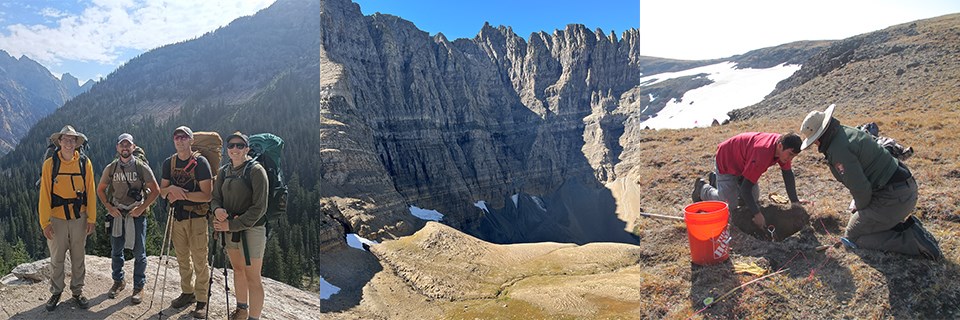Last updated: November 14, 2024
Article
Project Profile: High-Elevation Areas Impacted by Climate Change

Center: Snowfields at Piegan Pass, Glacier National Park. NPS/B. Rowley
Right: Test excavation in Southern Absaroka Range, Yellowstone National Park. Montana State University/S. Dersam
Inflation Reduction Act
Resilience | $722,400
The National Park Service (NPS) will study climate signals and their impacts to cultural resources at Yellowstone, Glacier, and Grand Teton National Parks. Data collected will inform adaptation strategies and develop predictive threat models that will be shared with NPS units, federal agencies, tribal communities, stakeholders in the Intermountain West, and NPS responding to the impacts of climate change on cultural resources.
Why? Climate change-driven impacts threaten archeological resources within parks, yet the understanding of these impacts remains limited. Less than two percent of the parks have an inventory for cultural resources, leaving critical gaps in knowledge. The urgency to act stems from the imperative to safeguard these cultural resources from anticipated loss or extensive damage within the next five years. This project aims to bridge these knowledge gaps by conducting Comprehensive Climate Vulnerability Assessments that focus on understanding climate signals and their impacts on cultural resources in micro-environments. By collaborating with associated Tribes and incorporating youth employment and internships, the project seeks to collect critical foundational data on endangered archaeological resources, informing the parks' response and adaptation strategies.
What Else? This project prioritizes collaborative research and proactive management. By partnering with Tribes and developing predictive models, the project seeks to inform adaptive strategies. With equitable resource distribution and a focus on knowledge sharing, it aims to enhance our understanding of the region's cultural heritage and foster resilience in the face of climate change.
